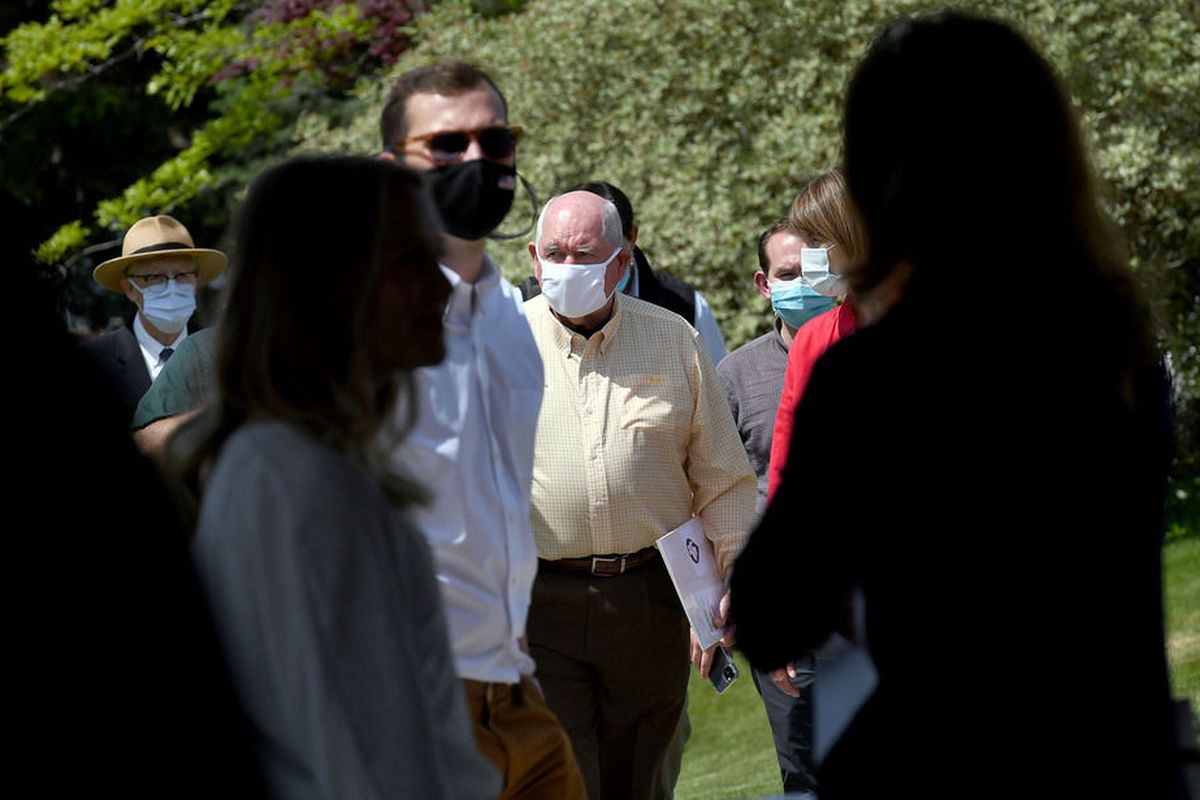Ag Secretary praises Spokane’s farm-grown food initiative as growers call for more support

U.S. Agriculture Secretary Sonny Perdue praised Spokane’s effort to get locally-grown food to needy families on Thursday, as the region’s wheat growers push for additional federal assistance during the coronavirus pandemic.
“I’m an optimist, and I’m hopeful,” said Perdue, who has served as the Trump administration’s Agriculture secretary since 2017. “I think the lessons we’re going to learn through this whole pandemic, of innovation and creativity, will once again show that America is the supreme innovator.”
A coalition of local farmers, distributors and volunteers, led by online marketplace Share.Farm, has distributed more than 35,000 pounds of food since it began operating under contract with the U.S. Department of Agriculture’s Farmers to Families Food Box program.
Perdue looked on Thursday afternoon in Liberty Lake as 20-pound boxes of fresh onions, potatoes, apples, pears and blueberries were prepared for delivery to the Northeast Spokane Community Center and homes throughout the Inland Northwest.
Perdue said he’s toured several other operations set up as part of a $3 billion assistance program included in a coronavirus aid package Congress passed in March. Eastern Washington’s program is the only one that’s providing service directly to customers’ doors.
“Most of them are congregant deliveries, where they come and put the box in the trunk and then they drive off,” Perdue said, adding the system could serve as a model for direct-to-home delivery for food stamp beneficiaries. The department has floated that idea to Congress in the past, Perdue said.
The food boxes program was one of the federal government’s quick pivots immediately following the closure in March of restaurants and schools, two major customers of the nation’s farmers, Perdue said.
Supply chains had to be rerouted quickly to avoid continued destruction of crops, livestock and their products, including milk being dumped down the drain and vegetables being plowed under because farmers didn’t have anyone to sell to. The Agriculture Department buys the food, then works with local contractors that distribute the food boxes to families in need.
In Spokane, that’s a partnership between Share.Farm, the Inland Northwest Farmers Market Association, Eat Good Group and Spokane Food Fighters. They’ve also received help from Vets on the Farm, an initiative of the Spokane Conservation District that gives military veterans opportunities to work in agriculture as they transition back to civilian life.
U.S. Rep. Cathy McMorris Rodgers said the partnerships showed the type of ingenuity that has been seen in several sectors since the onset of the pandemic, with local companies shifting their operations to manufacture protective equipment for health care providers and cleaning products.
“I was impressed with the diversity of organizations that are a part of it. It’s a real impressive partnership,” McMorris Rodgers said.
While the food box program is intended to redistribute needed food directly from farms to homes, the Agriculture Department also received funding from Congress to provide direct payments to growers of crops who saw dramatic price declines in the weeks and months since the pandemic started.
The Department has said it will provide assistance to farmers of crops who experienced a 5% or greater price decline during the economic downturn in the immediate aftermath of the outbreak, but under initial calculations that doesn’t include the soft white wheat variety grown on the hills of the Palouse.
“Our wheat fluctuated when COVID hit,” said Michelle Hennings, executive director of the Washington Association of Wheat Growers. “It didn’t fluctuate as drastically as the cattlemen and some of the other commodities, but we are concerned about the 2020 crop.”
Both the wheat association and McMorris Rodgers, in concert with her colleague Rep. Dan Newhouse, sent a letter last week to Perdue urging he and his department reconsider the exclusion of soft white wheat from the $16 billion available to assist farmers through direct payments. Perdue said Thursday the agency is accepting requests to add more crops to the list of eligible recipients through June 22, and clarified that some potato farmers who felt they’d been excluded from funding were eligible for assistance.
“There were a couple misinformations I think, about things that were already under contract were not eligible, that’s not really true,” said Perdue. “If their contracts were canceled, if they didn’t have a market for their shipping, they’ll be eligible. If they donated potatoes during that period of time, they’ll be eligible for indemnification there.”
Alex McGregor, a past president of the wheat association and president of the McGregor Co., a fertilizer and farm supply firm in Washington state, spoke with Perdue on Thursday and encouraged the secretary to add Eastern Washington’s wheat growers to recipients eligible for assistance under the aid package.
“These were challenging times this past spring, because that’s when people sell their crop,” McGregor said. “To have a market that already had challenges be impacted further by COVID-19 made it difficult for farm families.”
McGregor said that if the department used a different time frame to determine the dip in price, soft white wheat would be eligible. Futures prices were initially helped by Americans buying flour and bread at the beginning of the pandemic, but that bump did not benefit farmers, according to the wheat association.
McMorris Rodgers said Thursday she believed Perdue had heard the concerns of farmers.
“I think he’s still looking at that one,” the congresswoman said.
The Agriculture Department has kept a running tally of assistance paid out already under the Coronavirus Food Assistance Program, broken down by state. In Washington, much of the assistance has gone to ranchers and owners of dairy farms. Dairy farmers in Washington have received $3.2 million in assistance under the program, and ranchers $1.4 million. Orchardists had, by comparison, received $70,000, and farmers $55,000.
Farmers have until Aug. 28 to apply for assistance under the existing funding package. Perdue urged farmers to visit farmers.gov/cfap for information on eligible crops, and then to visit their local Farm Service Agency for additional information.